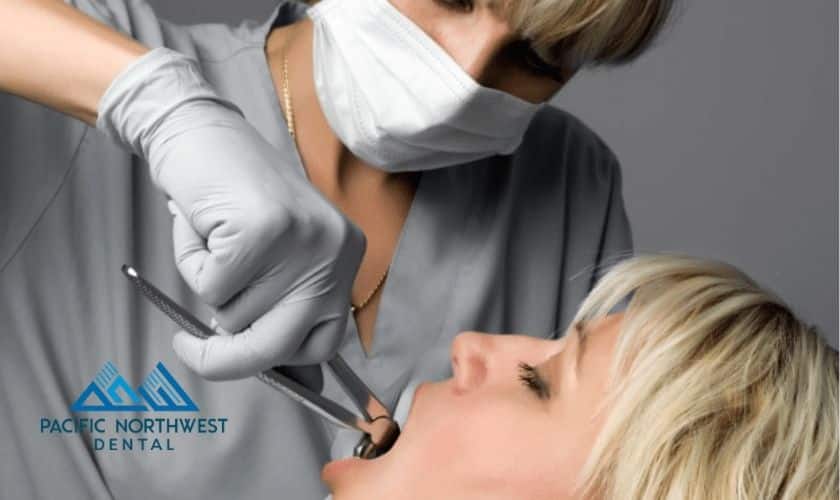
Getting a tooth pulled is not exactly on the top of anyone’s “can’t wait to do” list. That’s why we try to make the experience as pleasant as possible, in part by what we do here in our office, but also in advising you on how to care for your teeth when you leave.
After a tooth extraction, it’s particularly important to practice proper dental hygiene and precautions. If you’re not careful, dry socket can occur (when the nerve is exposed to air) which is much more painful than the tooth extraction itself. Before getting a tooth extracted, stock up on liquid favorites like smoothie ingredients and apple sauce.
If you’re facing a tooth extraction for the first time, don’t worry. Most people never get dry socket and are feeling great just a few days later. However, you do need to engage in a little prep work. Here’s how to best recover after an extraction.
PLAN AHEAD
Most people don’t need anything more than an OTC painkiller such as Tylenol after a tooth extraction. Make sure you have a bottle and take a dose immediately after the extraction and don’t wait until the pain sets in. You can also ask us, and we’ll recommend a painkiller that works best for you.
Wait at least 12 hours before cardio exercise, sleep with your head elevated on a pillow the night after surgery, and don’t lift at the gym for three days. Getting your blood pumping can lead to bleeding in the tooth socket. Consider this a doctor-approved excuse to take it easy for a couple of days.
DENTAL CARE
Avoid rinsing the day of and the day after surgery. The following day you may rinse gently with warm salt water, being careful not to disturb the clot formation in the surgery site. Continue the warm salt water rinsing until the extraction site is healed completely.
Avoid actually brushing over the extracted tooth site. You can wipe it with a damp cloth or piece of gauze, but for the first week, it’s best to let the site heal on its own. A rinse is more than enough to keep the area clean. Some people struggle with brushing the rest of their teeth because of swelling, but a Peridex rinse is enough of a brushing alternative for a few days.
DEALING WITH SIDE EFFECTS
Some people experience severe swelling, particularly if all their wisdom teeth are removed in one surgery. Placing an ice pack on your face in the area where the surgery was performed will help reduce the swelling and pain. You can begin using the ice pack as needed to reduce symptoms directly after surgery. Heat is not recommended until the inflamed area has calmed down. Heat will help the jaw muscles relax more, but will have minor affect on the extraction area.
Expect the pain to increase for two days, plateau at day three, and then decrease afterward. If pain increases after day three, call our office, you may have a dry socket or other trauma. In most cases, Motrin/Ibuprofen (200mg) is the best anti-inflammatory/pain reliever available. If you have an allergy, cannot take Motrin, or it makes your stomach hurt, please consult your physician for the best medication option.
If you’re prescribed antibiotics, make sure to take them in their entirety and don’t stop when you begin feeling better.
ADDITIONAL POST-OPERATIVE CONSIDERATIONS
Bleeding: Some bleeding is to be expected following surgery. Typical bleeding time can range from 1-4 hours post extraction. However, the color of the blood should decrease from deep red to clear-ish red and fluid-like during that period of time. If after four hours the bleeding is still profuse and deep in color, place a moist tea bag over the site, bite down with gentle pressure, and recheck the bleeding every 30 minutes. If this does not reduce or stop the bleeding significantly by 6-7 hours, or if you feel dizzy or sick as a result, go to the emergency room or call 911 as this may be an emergency.
Food: Eating may be difficult until after the anesthetic wears off. It is in your best interest to limit your diet to soft foods such as mashed potatoes and eggs or yogurt. These types of foods will not harm the extraction site/s and will rinse away easily with liquids. Also avoid any sucking for 48-72 hours after surgery, as this will tend to remove the clot that is forming.
Bone Fragments: Small pieces of bone may work up to the surface of the gums as the surgery site heals. Do not be concerned. These may dislodge with normal oral hygiene, but they also may need additional treatment/removal.
Sutures: In some cases, sutures are necessary to create a better healing outcome. Increased post operative sensitivity will occur as a result – this is normal. Some sutures will come out on there own, while others will need to be removed. Clean the adjacent teeth well while avoiding any contact with the sutures. Use mouth rinses and salt water rinses to decrease the plaque accumulation until they are gone/ removed.
No Tobacco: Nicotine will retard the formation of a good blood clot which is the first step in the healing process. Drawing on a cigarette can dislodge any clots that have begun to form and cause a dry socket. Refrain from any tobacco use for the first 24 hours after surgery, and try to minimize its use for another 48 hrs.
Healing time is typically 2-4 weeks if good oral hygiene is maintained. During this period the gums will heal over and after that period the bone will heal in under the gums for another two months.
Getting a tooth pulled is certainly not any fun, but it can be made much easier by following a few key steps.Go home and rest. Your body will respond better if you give it a chance to recuperate.
